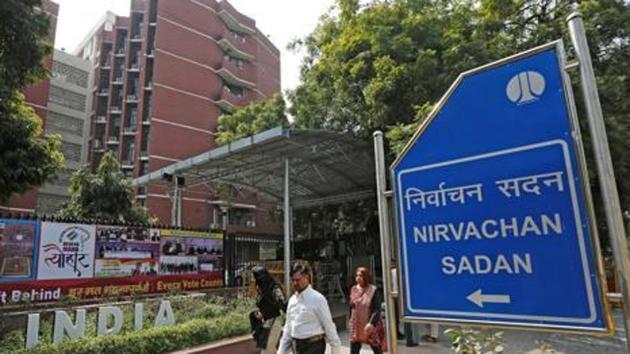Contestants, parties flouting Election Commission’s directive with impunity
Of the 96 candidates in the fray for eight Lok Sabha constituencies that went to poll in the first phase on April 11 in Uttar Pradesh, 24 had registered criminal cases against them, according to the data available on the Election Commission’s website.
Election candidates with criminal cases against them are supposed to get details of the cases published thrice, on different dates, at least two days before polling. Political parties are also required to put up information on tainted candidates fielded by them on their respective websites.

But none of the contestants or political parties has complied with this Election Commission (EC) directive issued in compliance with the Supreme Court order in the matter.
Of the 96 candidates in the fray for eight Lok Sabha constituencies that went to poll in the first phase on April 11 in Uttar Pradesh, 24 had registered criminal cases against them, according to the data available on the Election Commission’s website.
What is more, six out of these eight parliamentary constituencies, namely, Meerut, Bijnor, Ghaziabad, Baghpat, Gautam Buddh Nagar and Saharanpur were flagged as Red Alert constituencies by the EC.
A Red Alert constituency is one in which three or more of the candidates contesting have made a self-declaration of criminal cases against themselves. Meerut topped the list with five out of total 11 contestants, including those fielded by the BJP and the Congress having criminal charges against them, followed by four each in Bijnor and Ghaziabad. If Congress nominee from Bijnor, Naseemuddun Siddiqui has two cases registered against him, including one of POCSO (Protection of Children from Sexual Offences), BJP’s Bijnor nominee Raja Bhartendra Singh has three cases against him.
On being questioned for violating the EC’s directive, the response of political parties was on expected lines. “We have not given ticket to any criminal candidate. Whatever cases have been lodged were politically motivated and there has been no conviction in any of them so far,” said Congress party’s media coordinator Rajiv Bakshi. He parried a question as to why the information on the candidate’s antecedents was not put up on the party’s website.
The BJP had a different take. “We are gathering information on our candidates but whatever information we have received about our nominees we have uploaded on our website,” said JPS Rathore, vice president of UP BJP.
But a fact check revealed that there was no such information available on BJP’s website. The Samajwadi Party was more guarded in its response. “We will follow every instruction of the EC. As far as publication of a candidate’s antecedents is concerned, we are in the process of collating and collecting this information and would upload them soon,” said party spokesperson Abdul Hafiz Gandhi.
“The idea behind the court’s and EC directive was to enable voters to make an informed choice. That is, they should know about the credential of the contestant, who they would be voting for,” says Athar Hussein of the Centre for Objective Research and Development, a voluntary organisation working in the field of education.
Civil society organisations like the Association for Democratic Reforms and the National Election Watch have already shot off a letter to Election Commission on the violation of these directives. “This is an outright non-compliance of the SC order and the EC directions by candidates as well as the political parties in the first phase of Lok Sabha Elections 2019. We have written to the EC requesting them to take necessary action and to pursue this matter actively in the remaining phases of elections,” said Sanjay Singh of the UP Election Watch.






